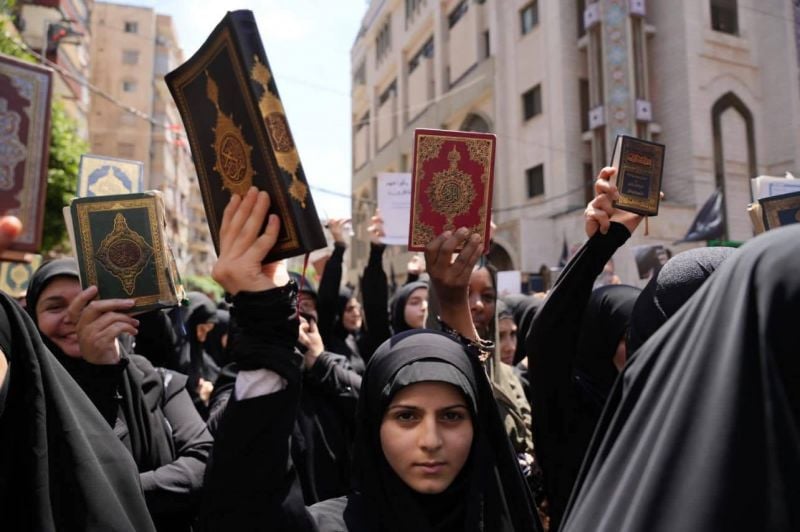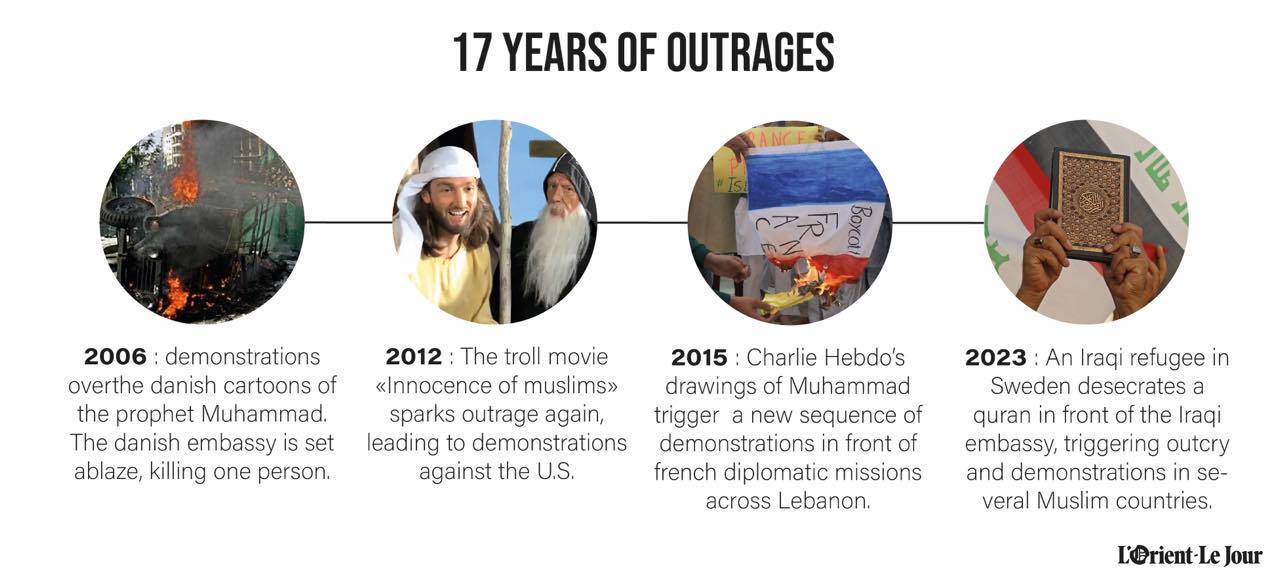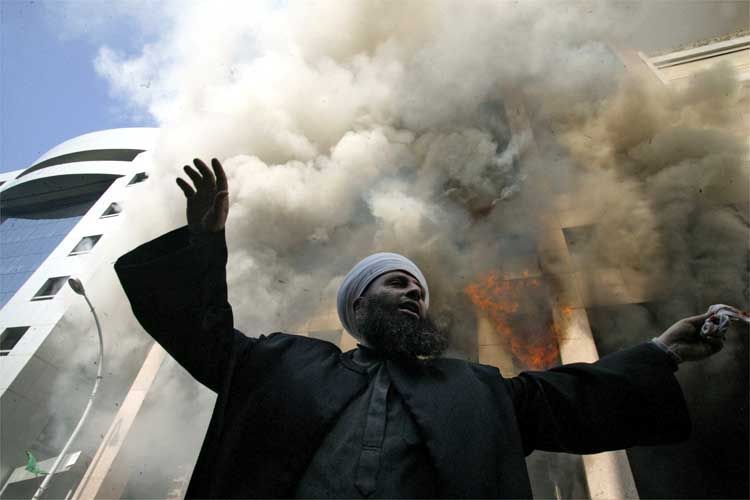
Women demonstrating in Beirut's southern suburbs, July 21, 2023, over Quran profanation in Sweden. (Credit: Mohammad Yassin/L'Orient Today)
BEIRUT — In the last two decades, the publication of controversial cartoons and films targeting Islam and Prophet Muhammad have ignited fiery protests and violent clashes across the world, including Lebanon.
On June 29, Salwan Momika, a 37-year-old Iraqi, tore up and lit pages of the Islamic holy book on fire in Stockholm during a protest authorized by police, as Muslims celebrated the Eid al-Adha holiday.
The incident, which took place outside the Stockholm Central Mosque, prompted condemnation and protests across the Muslim world, including criticism from Lebanese religious figures and parties.
On July 7, a few dozen people, including religious dignitaries, gathered in front of the Al-Amin mosque in downtown Beirut to express their displeasure with the provocative act.

On Wednesday, a mini-assembly was authorized by the Swedish police, where the Quran was trampled on but not burned as planned.
The next day, Hezbollah leader Hassan Nasrallah called for the expulsion of the Swedish ambassador to Lebanon and protests in response to the burning of the Quran. Several hundred people responded to this call for a demonstration in Beirut's southern suburbs.
In this article, we examine the outrage that unfolded in Lebanon following the Danish controversial cartoons depicting Prophet Muhammad in 2006; the 2012 Innocence of Muslims film, and the 2015 French satirical weekly Charlie Hebdo's provocative cartoons.
2006: The Danish controversial cartoons
In 2006, Lebanon was engulfed in riots and violence over the publication of controversial Danish cartoons that depicted Prophet Muhammad.
Months earlier, on Sept. 30, 2005, the Danish newspaper Jyllands-Posten released a series of 12 cartoon illustrations, which were considered offensive by many Muslims due to the Islamic teaching that graphic representations of the Prophet are forbidden.
Furious protesters took to the streets in Lebanon on Feb. 5, 2006, to express their outrage. The Danish consulate in Beirut fell victim to the unrest when protesters torched the building. The incident culminated in violent clashes with Lebanese security forces and property damage in Beirut neighborhoods, NPR reported.
 A Muslim cleric joins the demonstration over the controversial Danish cartoons, Feb. 5, 2006 in Beirut. (Credit: AFP)
A Muslim cleric joins the demonstration over the controversial Danish cartoons, Feb. 5, 2006 in Beirut. (Credit: AFP)
The peaceful march through downtown Beirut in the morning quickly turned into turmoil when a breakaway group surged towards a high-rise building housing the Austrian and Danish Missions.
Chanting offensive anti-Danish slogans, the protesters engaged in acts of vandalism, targeting cars, office buildings, and even a Maronite Catholic church in the vicinity.
Lebanese security forces attempted to disperse the crowds using tear gas, but a faction managed to breach the security lines and reach the building housing the Danish Mission. There, they smashed windows and set the building on fire, resulting in the tragic death of one individual who tried to escape the fire.
The violence continued to escalate as protesters clashed with police officers and set fire to several fire engines.
 Army troops arrive at the scene of over the controversial Danish cartoons, Feb. 5, 2006 in Beirut. (Credit: AFP)
Army troops arrive at the scene of over the controversial Danish cartoons, Feb. 5, 2006 in Beirut. (Credit: AFP)
The situation spiraled out of control, leading to the resignation of Lebanon's then-Interior Minister Hassan al-Sabaa over the handling of the crisis.
2012: Outrage over Innocence of Muslims film
In 2012, Lebanon once again witnessed widespread protests and violent clashes, this time over the anti-Islam film Innocence of Muslims, which denigrates Islam and Prophet Muhammad.
The film sparked fury among Muslims across the Middle East, leading to demonstrations and attacks on US embassies and symbols, notably in Libya, where the US consul, Christopher Stevens, was killed in Benghazi.
Hezbollah leader Hassan Nasrallah condemned the film, urging Muslims and Christians to remain vigilant and avoid descending into strife. Nasrallah held the US accountable for creating tensions between religious communities and called for demonstrations in Lebanon.
"Prophet of God, we offer ourselves, our blood and our kin for the sake of your dignity and honor," Nasrallah told supporters who chanted "death to Israel" and "death to America" at a protest in the southern suburbs of Beirut. "The US should understand that if it broadcasts the film in full it will face very dangerous repercussions around the world," The Guardian reported at the time.
Following Nasrallah's speech, protests erupted across the country, including in Lebanon's southern coastal town of Sour and the Beqaa town of Hermel, according to NBC News.
Reuters also reported that Lebanese security forces opened fire after protesters torched a fast food restaurant in Tripoli, North Lebanon, and threw rocks at a state building, shouting anti-American slogans.
However, despite the widespread anger, Lebanon's protests remained relatively controlled compared to other regions as the concurrent visit of Pope Benedict XVI to Lebanon at the time played a role in maintaining a sense of unity and restraint.
2015: Charlie Hebdo cartoon controversy
In 2015, protests also erupted in various regions in Lebanon in response to the French satirical weekly Charlie Hebdo's publication of a cartoon depicting the Prophet Muhammad on its cover.
On Jan. 7 of that year, Islamist terrorists attacked Charlie Hebdo headquarters in Paris, killing 12 people.
On Jan. 16, in Lebanon's capital, around 100 people gathered in Lebanon's capital to denounce the cartoon. Police took precautions by blocking a road leading to the French embassy, anticipating unrest.
In Saida, South Lebanon, Palestinian protesters gathered outside a mosque to voice their opposition to the French magazine's depiction of the Prophet Muhammad. Security forces were heavily deployed in various parts of the city, particularly outside the French cultural center.
In Tripoli, North Lebanon, dozens of protesters also gathered to denounce the magazine's cartoon. The Lebanese Army disbanded the protests due to high-security threats in the city and prevented any further escalation of tensions.
According to the New York Times, Nasrallah at the time criticized extremists who kill those they consider infidels in the name of Islam — “without explicitly denouncing the Paris killings.”
Hezbollah also released a statement condemning the controversial cartoon.
“Such an action is absolutely rejected,” it said, calling the illustration “a big provocation to the feelings of more than one and a half billion Muslims in the world, all of them believers in heaven’s messages and keen for dialogue and common values. Such actions directly contribute to supporting terrorism, extremism and extremists.”
Early Jan. 2023, Charlie Hebdo published cartoons depicting Iranian Supreme Leader Ayatollah Ali Khamenei. In response, Hezbollah criticized the controversial cartoons, deeming the drawings insulting.